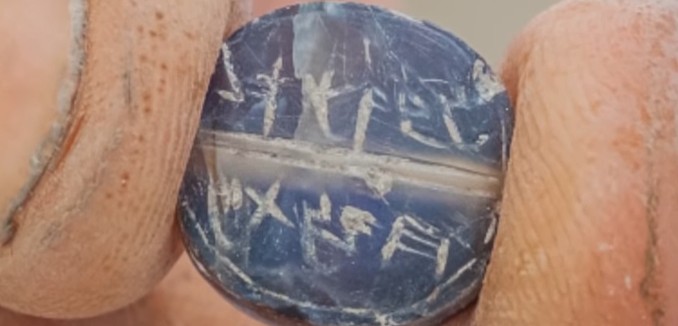An artifact bearing the name of an aide to the biblical Israelite King Josiah was found in Jerusalem, The Jerusalem Post reported Monday.
A bulla, a piece of clay used to bind documents together, bears the name of “Nathan-Melech, Servant of the King.” Dr. Anat Mendel-Geberovich of the Hebrew University of Jerusalem and the Center for the Study of Ancient Jerusalem deciphered the writing on the bulla. Nathan-Melech is mentioned once in the Bible — in II Kings 23:11 — and is identified there as an aide to King Josiah, who ruled Judea during the First Temple period.
“Although it is not possible to determine with complete certainty that the Nathan-Melech who is mentioned in the Bible was in fact the owner of the stamp,” Mendel-Geberovich said, “it is impossible to ignore some of the details that link them together.”
The clay bulla and other antiquities were found in what was once a public building in the area known as the City of David, located just south of the Old City of Jerusalem. Excavations have been ongoing in an area that used to be used as a parking lot. Archeologists from both the Israel Antiquities Authority (IAA) and Tel Aviv University (TAU) are supervising the excavations in that area.
A second notable artifact was also discovered, a stamp-seal, which was made “bluish agate stone, engraved with the name – ‘(belonging) to Ikar son of Matanyahu,’” according to a statement released by Prof. Yuval Gadot of TAU and Dr. Yiftah Shalev of the IAA.
“Since many of the well-known bulla and stamps have not come from organized archaeological excavations but rather from the antiquities market, the discovery of these two artifacts in a clear archaeological context that can be dated is very exciting,” the statement added.
The recently-discovered antiquities “attest to the highly developed system of administration in the Kingdom of Judah and add considerable information to our understanding of the economic status of Jerusalem and its administrative system during the First Temple period,” Gadot and Shalev explained.
Other recent discoveries attesting to the Jewish life in Jerusalem thousands of years ago included a 2,000-year-old woman’s ring found outside of an ancient ritual bath, a biblically-mentioned weight from the First Temple period, and a 2,000-year-old inscription of the word “Jerusalem.”
[Photo: Israel Antiquities Authority Official Channel / YouTube ]




